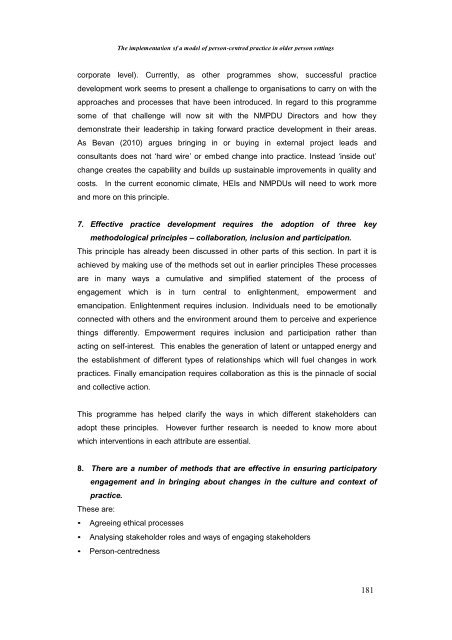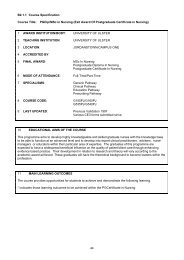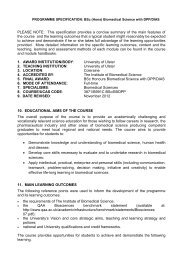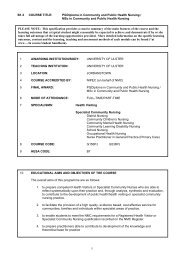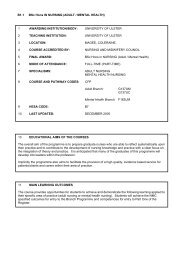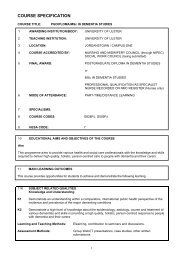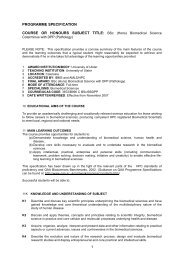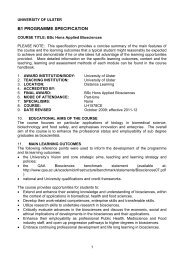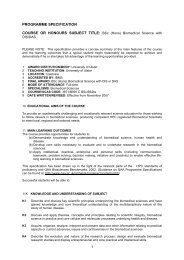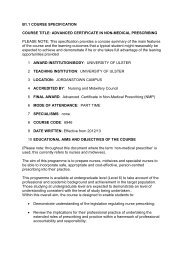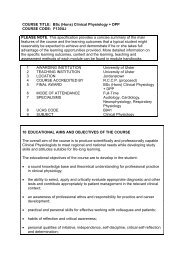The Implementation of a Model of Person-Centred Practice In Older ...
The Implementation of a Model of Person-Centred Practice In Older ...
The Implementation of a Model of Person-Centred Practice In Older ...
Create successful ePaper yourself
Turn your PDF publications into a flip-book with our unique Google optimized e-Paper software.
<strong>The</strong> implementation <strong>of</strong> a model <strong>of</strong> person-centred practice in older person settings<br />
corporate level). Currently, as other programmes show, successful practice<br />
development work seems to present a challenge to organisations to carry on with the<br />
approaches and processes that have been introduced. <strong>In</strong> regard to this programme<br />
some <strong>of</strong> that challenge will now sit with the NMPDU Directors and how they<br />
demonstrate their leadership in taking forward practice development in their areas.<br />
As Bevan (2010) argues bringing in or buying in external project leads and<br />
consultants does not ‘hard wire’ or embed change into practice. <strong>In</strong>stead ‘inside out’<br />
change creates the capability and builds up sustainable improvements in quality and<br />
costs. <strong>In</strong> the current economic climate, HEIs and NMPDUs will need to work more<br />
and more on this principle.<br />
7. Effective practice development requires the adoption <strong>of</strong> three key<br />
methodological principles – collaboration, inclusion and participation.<br />
This principle has already been discussed in other parts <strong>of</strong> this section. <strong>In</strong> part it is<br />
achieved by making use <strong>of</strong> the methods set out in earlier principles <strong>The</strong>se processes<br />
are in many ways a cumulative and simplified statement <strong>of</strong> the process <strong>of</strong><br />
engagement which is in turn central to enlightenment, empowerment and<br />
emancipation. Enlightenment requires inclusion. <strong>In</strong>dividuals need to be emotionally<br />
connected with others and the environment around them to perceive and experience<br />
things differently. Empowerment requires inclusion and participation rather than<br />
acting on self-interest. This enables the generation <strong>of</strong> latent or untapped energy and<br />
the establishment <strong>of</strong> different types <strong>of</strong> relationships which will fuel changes in work<br />
practices. Finally emancipation requires collaboration as this is the pinnacle <strong>of</strong> social<br />
and collective action.<br />
This programme has helped clarify the ways in which different stakeholders can<br />
adopt these principles. However further research is needed to know more about<br />
which interventions in each attribute are essential.<br />
8. <strong>The</strong>re are a number <strong>of</strong> methods that are effective in ensuring participatory<br />
engagement and in bringing about changes in the culture and context <strong>of</strong><br />
practice.<br />
<strong>The</strong>se are:<br />
• Agreeing ethical processes<br />
• Analysing stakeholder roles and ways <strong>of</strong> engaging stakeholders<br />
• <strong>Person</strong>-centredness<br />
181


